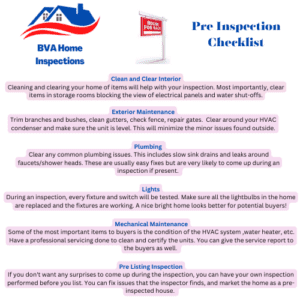Pre Inspection Checklist

How to Prepare for a Home Inspection: A Guide by BVA Home Inspections
Purchasing a new home is one of the most exciting milestones in life, but it’s also one of the biggest investments you’ll ever make. Before you sign on the dotted line, it’s essential to make sure your potential new home is in tip-top shape. That’s where a professional home inspection comes in!
At BVA Home Inspections, we understand how important it is to have all the facts before making a decision. Our job is to provide a thorough, unbiased inspection of the property, but there are a few things you can do to ensure the process runs smoothly and you get the most out of it. Here’s how to prepare for your upcoming home inspection:
1. Make the Home Accessible
One of the most important things you can do is ensure that our inspectors have easy access to all parts of the home. This includes:
- Attic: Clear any obstacles that might block the attic access. Our team will need to inspect insulation, ventilation, and structural integrity up there.
- Basement: Move any stored items away from the walls so we can inspect for potential water damage, mold, and foundation issues.
- Crawlspaces: Ensure that crawlspaces are accessible by removing debris or clutter. These areas are key for checking for moisture, pests, or foundation issues.
- Electrical Panels & Appliances: Clear the area around the electrical panel, water heater, and HVAC system so we can perform necessary checks.
2. Provide Documents & Maintenance History
If you have any past maintenance or repair records for the home, especially for systems like plumbing, electrical, or the roof, provide those to the inspector. This helps our team understand the home’s history and can give us insight into potential issues or improvements made over time.
3. Ensure Utilities Are On
For a comprehensive inspection, all utilities need to be on. This includes electricity, water, gas, and HVAC systems. Our team will need to check things like heating, cooling, plumbing, and electrical systems, so having everything turned on ensures that nothing is missed.
4. Be Present, But Not in the Way
While we’re working, you’re welcome to join us during the inspection, but it’s important to stay out of the way while we’re in action. This allows us to focus on our tasks and also lets you ask questions as we go along. Our inspectors will be happy to explain what they’re looking at and answer any concerns you might have.
5. Take Care of Pets
If you have pets, make sure they are kept in a separate room or outside during the inspection. This ensures both the pets and the inspector are safe and minimizes distractions while we’re working.
6. Make Sure the Inspector Can Reach the Roof
While we do our best to check the roof, some homes have hard-to-reach areas. If your home has tall trees or other obstructions that could block access to the roof, it’s a good idea to trim back branches beforehand. If our inspectors can’t reach the roof safely, we’ll use specialized equipment or recommend alternative ways to inspect it.
7. Know What to Expect
Understanding the home inspection process will make the experience much smoother. Our inspections are comprehensive, focusing on the overall safety, functionality, and condition of the home. We’ll examine:
- Structural elements: Foundation, framing, walls, ceilings, etc.
- Exterior: Roof, siding, windows, doors, drainage, and landscaping.
- Interior: Plumbing, electrical, appliances, flooring, and walls.
- Systems: HVAC, water heaters, and more.
Afterward, you’ll receive a detailed report outlining everything our inspector found, from minor issues to major concerns. We’ll go over this report with you, and our goal is to make sure you feel confident in your decision.
8. Prepare for the Weather
While most home inspections happen year-round, weather conditions can impact certain areas, especially when inspecting the exterior or roof. Make sure the inspector has access to the property without any obstacles caused by weather, such as snow or ice that might obscure important features.
9. Ask Questions!
Don’t be afraid to ask questions during the inspection! Our inspectors are experienced professionals and will be happy to explain any findings and offer advice on what repairs or maintenance may be needed.
In Conclusion
A home inspection is a critical part of the home-buying process, and preparation is key to making sure you get the most from it. By making sure the home is accessible, utilities are on, and any relevant documents are available, you can help our inspectors do their best work, which leads to better results for you.
If you’re getting ready for a home inspection, BVA Home Inspections is here to ensure you have the information you need to make an informed decision. Contact us today to schedule your inspection and start your home-buying journey with confidence!

Leave a Reply
Want to join the discussion?Feel free to contribute!